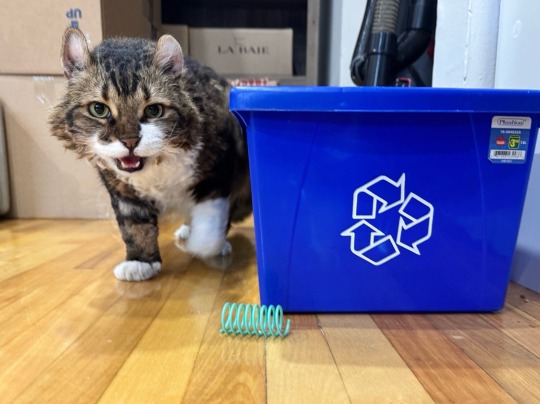#learn to blog
Explore tagged Tumblr posts
Text
i had a thought of "do people not know what AUs are anymore?" and then i remembered nobody explains fandom stuff to new people anymore so it is entirely plausible people genuinely don't know what AUs are and nobody has explained it to them, so for today's lucky 10,000:
"AU" stands for "Alternate Universe" or "Alternative Universe" (same difference) and is basically any thought scenario for a fandom that isn't canon and can't fit within the canon universe. If it takes place in the canon universe but something is notably different, that is typically what's known as a "Canon divergent AU," because it diverges from canon.
an AU can be absolutely anything. There's a couple of widespread pan-fandom au scenarios that often get thrown around, like coffee shop aus, genderbend aus, hanahaki aus (hanahaki is a whole thing in itself i'd recommend researching on your own), etc. One you might hear sometimes is "crossover AU" which is when you have characters from one fandom interacting with characters from another.
You can have as many aus as you want. They can be whatever you want and you can do whatever you want in them. It's a sandbox for you to play around in and explore how things would be different or how the characters would act in those circumstances or environments. Maybe they have different relationships with each other. Maybe they behave slightly differently. Or you can just say "Okay, [x] is true. How did they get here? How would things have to be different for this to occur?" which can also be fun.
If you are ever confused about why people ship something that seems completely out of the blue or doesn't make sense to you in the canon setting, there's a good chance they like it in an AU setting! Not everything everybody is interacting with is necessarily the canon! Not everybody wants things to exist in canon and just want to explore playing dolls in a different sandbox and that's okay. And their sandbox might look a lot different than yours, and that's also okay. You have the freedom to make your sandbox whatever you please. Do whatever you want forever. Get funky with it. AUs are fun.
Okay that's my schpeal. everybody go have fun and play nice now.
#fandom#fandom infrastructure#fandom history#was working on the ship polls blog and the comments i get there often reminded me of this#every once in a while i've gotta reacquaint myself with the xkcd expert familiarity comic principle#and the general knowledge that people dont explain the basics of fandom anymore so people have to learn it on their own#while everybody just expects them to know it and that's not fair to them!#i will also put my usual thing: folks are always welcome to ask me anything about fandom stuff#it can be specific pjo fandom stuff or general pan-fandom stuff#i have been in fandom for a long time and i am happy to explain things#legitimately if anyone ever has questions about even the most basic of fandom stuff. go for it. i love talking about it
22K notes
·
View notes
Text

couldnt draw my thang for mid-autumn so treated myself to a calne redesign instead
#calne ca#hatsune miku#VOCALOID#cw: body horror#<- And I Fucking Mean That We Are Not Fucking Around Today#well we are. as in I drew this as a fuckaround treat for myself#but the body horror tag is the most warranted its ever been on this blog#ask to tag#I am as ever on my journey to make calne ca Worse. her OG version is too cool. even the crab ver is too cool#I need her to be worse to look at. I am also getting myself into to mood to test my hand at boarding a pmv for my friend's cover#I think my thought for this was ''I should try and give her a more insectoid bodyplan''#which in this mostly means gently three-part body and six limbs (my favourite amount of limbs to draw rn)#actually almost gave her eight but didnt like how that silhouette came out so I mermaided her uh. abdomen I guess#though maybe next time I do this I should push that idea more. the head and torso are still very distinct for one unified part#I feel like one of my old attempts was onto something with like. a more horizontal body plan... well! live and learn etc#happy late mid autumn I guess. I should play with touys about it... I miss model kits. mayhaps...
14K notes
·
View notes
Text
“if you could pick up another language, what would it be?”
“i’d go russian. i’d love to know what geno says or has said over the years… i’d love to know 🥰 i just want to know (giggles) 🥰”
#first it was russia with geno… now it’s russian for geno… girl PLEASE#i think the funniest part though is dan going 🤨 wait. when is he speaking russian 🤨 that you want to learn it 🤨#and sid realises: oh no. i can’t say ‘when we’re cuddled up in bed and he’s kissing the back of my neck and whispering#sweet nothings in russian into my ear’ QUICK. MAKE IT MAKE SENSE#and then wild-eyed he goes on and on about oh yknow. on the bench. sometimes. at players. but also refs. but not all the time.#it’s not consistent. some times. also i’m normal i promise 🥺#also geno counting in spanish <333#in case you’re curious: hayesy ned and rusty would learn italian (rusty’s half italian. ned wants to retire in italy :’))#matt grzelyck: chinese!!! go off!!!#lizzo: finnish so he can speak with his extended family 🥺#so yes. no one else said: i want to learn a language because i want to KNOW my teammate of 20 years. only sid#also reviving my old sports blog url to use as a watermark for any iphs i’ll post#please don’t repost this on twitter (and in your discord chats :’))#sidney crosby#evgeni malkin#pittsburgh penguins#sidgeno#inside penguins hockey#hockey#nhl
3K notes
·
View notes
Text
Did you know that the english word “star” and the japanese word 星(ほし)don’t actually mean the same thing?
Language does not simply name pre-existing categories; categories do not exist in 'the world'
— Daniel Chandler, Semiotics for Beginners
I read this quote a few years ago, but I don’t think I truly understood it until one day, when I was looking at the wikipedia article for “star” and I thought to check the Japanese article, see if I could get some Japanese reading practice in. I was surprised to find that the article was not titled 「星」, but 「恒星」, a word I’d never seen before. I’d always learnt that 星 was the direct translation for “star” (I knew the japanese also contained meanings the english didn’t, like “dot” or “bullseye”, but I thought these were just auxiliary definitions in addition to the direct translation of “star” as in "a celestial body made of hydrogen and helium plasma").
To try and clear things up for myself, I searched japanese wikipedia for 星. It was a disambiguation page, with the main links pointing to the articles for 天体 (astronomical object) and スター(記号)(star symbol). There was no article just called 「星」.
It’s an easy difference to miss, because in everyday conversation, 星 and star are equivalent. They both describe the shining lights in the night sky. They both describe this symbol: ★. They even both describe those enormous celestial objects made of plasma.

But they are different - different enough to not share a wikipedia article. 星 is used to describe any kind of celestial body, especially if it appears shiny and bright in the night sky. “Star” can be used this way too (like Venus being called the “morning star”), but it’s generally considered inaccurate to use the word like this, whereas there is no such inaccuracy with 星. You can say “oh that’s not actually a star, it’s a planet”, but you CAN’T say 「実はそれは星ではなく惑星だよ」 (TL: that’s not actually a hoshi, it’s a planet). A planet IS a 星.
星 is a very common word, essentially equivalent to “star”, but its meaning is closer to “celestial body”. I haven’t looked into the etymology/history but it’s almost like both english and japanese started out with a simple, common word for the lights in the sky - star/星 , but as we found out more about what these lights actually were, english doubled down on using the common word for the specific scientific concept, while japanese kept the common word generic and instead came up with a new word for the more specific concept. If this is actually what happened, I’d guess that kanji probably had something to do with it - 星 as a component kanji exists inside the word for planet, 惑星, and in the word for comet, 彗星, and in the scientific word for “star”, 恒星, so it makes sense that it would indicate a more general concept when used standalone.
This discovery helped me understand that quote - categories don’t exist in the world, we are the ones who create them. I thought that the concept of “star” was something that would be consistent across all languages, but it’s not, because the concept of “star” is not pre-existing. Each language had to decide how to name each of those similar star-like concepts (the ★ symbol, hot balls of gas, twinkling lights in the sky, planets, comets, etc), and obviously not every language is going to group those concepts under the same words with the same nuance.
Knowing this, one might be tempted to say that 恒星(こうせい) is the direct translation for “star”. But this isn’t true either. In most of the contexts that the word “star” is used in english, the equivalent japanese will be simply 星. Despite the meanings not lining up exactly, 星 will still be the best translation for “star” most of the time. This is the art of translation - knowing when the particulars are less important than the vibe or feel of a word. For any word, there will never be an exact perfect translation with all the same nuances and meanings. Translation is about finding the best solution to an unsolvable problem. That's why I love it.
#translation#japanese#japanese language#learning japanese#language#langblr#language learning#semiotics#linguistics#japanese vocab#jimmy blogthong#official blog post
6K notes
·
View notes
Text
Stopping yourself mid-conflict to change your perspective is allowed! It’s okay and normal to be mid argument with someone and realize you disagree with your own stance. Often I find myself and others caught up in trying to win the argument (not the point of arguments!) or too embarrassed to back down and be wrong. I promise there is so much more pride in going “Stop! I’m wrong. I hear you and I see how I wasn’t in the right and I want to amend my view” than digging your heels in.
#also how to argue productively is a whole post#suggestions#suggestion blog#recovery#positivity#self love#mental health#self care#ed recovery#love#relationships#shame#arguments#growth#conflict#ignorance#learning#self improvement#healing#mental illness
7K notes
·
View notes
Text

Spring is mine!!!!!
#jimmys face is me when i learned half my posts didnt post yesterday lool#jimmy faces#cat blog#cats of tumblr#catblr#curly cat
1K notes
·
View notes
Text


coffee + ancient greek ˖˚⊹ ꣑ৎ (or pics from study sessions that i never posted)
#studyblr#study blog#studying#studyinspo#studyspo#ancient greek#study motivation#uni studyblr#dark academia#study aesthetic#study inspiration#study inspo#study movitation#uniblr#langblr#ancient greek language#language blr#language learning#language study#student life#uni life#uni student#university student
3K notes
·
View notes
Text

🏹🐦💘 happy holidays from your favorite super-heroes!! 💘
(i am not late today is the 25th everyone please shh)
fanart inspired from @kitsuneisi and @xmaruu11 's DDVAU! my brain is so rotten with these two silly gooses...
#artwork#artists on tumblr#drawing#digital art#hermitcraft#<- i'm only using that tag so my blog can be tagged properly#happy holidays!!#brain... so rotten... it's all... too sweet...#i think this is a grand time to say i have learned i like drawing wings#what will i do with this information? who knows#also if anyone is reading this my commissions are open i am so very poor pls n thx
3K notes
·
View notes
Text

#worksheets#agere class#agere classroom#agere daycare#agere school#agere#age regression#sfw agere#sfw littlespace#age regressor#sfw age regression#agereg#age dreaming#sfw little blog#agere blog#Ciao lovelies#Agere diys#Agere diy#Agere craft#Agere crafts#Agere learning
2K notes
·
View notes
Text

Horse breed of the day: Trait Du Nord
Height: 15 -17hh
Common coat colors: Bay, various roans and black
Place of origin: France
#trait du nord horse#horseblr#attributes:#laid back#strength#versatile#if theres anything to learn from this blog its that france makes the Biiiig draught breeds#of course i say that half jokingly
1K notes
·
View notes
Text
I made a barely animated thing!

Someone should probably give him a hug ...
#obi wan 'poor lil meow meow' kenobi#obi wan kenobi#my art#star wars fanart#obi wan fanart#animation? on my blog? its more likely than you think#but fr animation is hard#im trying to learn#this is only very technically animatwd#star wars#my gif
3K notes
·
View notes
Text

Don't let it in with no intention of keeping it Jesus Christ, don't be kind to it It Will Come Back - Hozier
Hiiii I've been working on this piece for like a week bc I've had this thought abt this song and scene ever since I read it. Fanart for @seriouslycalamitous 's fic Midnight Strangers!
#trafficblr#goodtimeswithscar#art#midnight strangers fanart#oh cool thats its own tag? sick#trafficshipping#<- not explicitly in this art but the fic is. yknow#scarian#hi my handful of normal mutuals following this blog! im normal i promise (lie)#anyways yeah ive had this in my head since chapter 3 and then seeing everyone else's sickass fanart rlly helped motivate me#i learned so much abt ways to shade doing this guys. they were right mcyt really does make you a better artist LMAO#ink does minecraft art tag
896 notes
·
View notes
Text






took my german b1 level mid-term, patiently waiting for the result.
#studying#studyblr#studyspo#studystudystudy#study motivation#study blog#studygram#student#studyinspo#study space#study hard#study#study aesthetic#study inspiration#learning german#learn german#langblr#lunlunstudies
2K notes
·
View notes
Text
Gendered pronouns in Japanese vs English
In Revolutionary Girl Utena, the main character Utena is a girl (it says so in the title), but very conspicuously uses the masculine first person pronoun 僕 (boku) and dresses in (a variation of) the boys school uniform. Utena's gender, and gender in general, is a core theme of the work. And yet, I haven’t seen a single translation or analysis post where anyone considers using anything other than she/her for Utena when speaking of her in English. This made me wonder: how does one’s choice of pronouns in Japanese correspond to what one’s preferred pronouns would be in English?

There are 3 main differences between gendered pronouns in Japanese vs English
Japanese pronouns are used to refer to yourself (first-person), while English pronouns are used to refer to others (third-person)
The Japanese pronoun you use will differ based on context
Japanese pronouns signify more than just gender
Let’s look at each of these differences in turn and how these differences might lead to a seeming incongruity between one’s Japanese pronoun choice and one’s English pronoun choice (such as the 僕 (boku) vs she/her discrepancy with Utena).
Part 1: First-person vs third-person
While Japanese does technically have gendered third person pronouns (彼、彼女) they are used infrequently¹ and have much less cultural importance placed on them than English third person pronouns. Therefore, I would argue that the cultural equivalent of the gender-signifying third-person pronoun in English is the Japanese first-person pronoun. Much like English “pronouns in bio”, Japanese first-person pronoun choice is considered an expression of identity.
Japanese pronouns are used exclusively to refer to yourself, and therefore a speaker can change the pronoun they’re using for themself on a whim, sometimes mid-conversation, without it being much of an incident. Meanwhile in English, Marquis Bey argues that “Pronouns are like tiny vessels of verification that others are picking up what you are putting down” (2021). By having others use them and externally verify the internal truth of one’s gender, English pronouns, I believe, are seen as more truthful, less frivolous, than Japanese pronouns. They are seen as signifying an objective truth of the referent’s gender; if not objective then at least socially agreed-upon, while Japanese pronouns only signify how the subject feels at this particular moment — purely subjective.
Part 2: Context dependent pronoun use
Japanese speakers often don’t use just one pronoun. As you can see in the below chart, a young man using 俺 (ore) among friends might use 私 (watashi) or 自分 (jibun) when speaking to a teacher. This complicates the idea that these pronouns are gendered, because their gendering depends heavily on context. A man using 私 (watashi) to a teacher is gender-conforming, a man using 私 (watashi) while drinking with friends is gender-non-conforming. Again, this reinforces the relative instability of Japanese pronoun choice, and distances it from gender.

Part 3: Signifying more than gender
English pronouns signify little besides the gender of the antecedent. Because of this, pronouns in English have come to be a shorthand for expressing one’s own gender experience - they reflect an internal gendered truth. However, Japanese pronoun choice doesn’t reflect an “internal truth” of gender. It can signify multiple aspects of your self - gender, sexuality, personality.
For example, 僕 (boku) is used by gay men to communicate that they are bottoms, contrasted with the use of 俺 (ore) by tops. 僕 (boku) may also be used by softer, academic men and boys (in casual contexts - note that many men use 僕 (boku) in more formal contexts) as a personality signifier - maybe to communicate something as simplistic as “I’m not the kind of guy who’s into sports.” 俺 (ore) could be used by a butch lesbian who still strongly identifies as a woman, in order to signify sexuality and an assertive personality. 私 (watashi) may be used by people of all genders to convey professionalism. The list goes on.
I believe this is what’s happening with Utena - she is signifying her rebellion against traditional feminine gender roles with her use of 僕 (boku), but as part of this rebellion, she necessarily must still be a girl. Rather than saying “girls don’t use boku, so I’m not a girl”, her pronoun choice is saying “your conception of femininity is bullshit, girls can use boku too”.

Through translation, gendered assumptions need to be made, sometimes about real people. Remember that he/they, she/her, they/them are purely English linguistic constructs, and don’t correspond directly to one’s gender, just as they don’t correspond directly to the Japanese pronouns one might use. Imagine a scenario where you are translating a news story about a Japanese genderqueer person. The most ethical way to determine what pronouns they would prefer would be to get in contact with them and ask them, right? But what if they don’t speak English? Are you going to have to teach them English, and the nuances of English pronoun choice, before you can translate the piece? That would be ridiculous! It’s simply not a viable option². So you must make a gendered assumption based on all the factors - their Japanese pronoun use (context dependent!), their clothing, the way they present their body, their speech patterns, etc.
If translation is about rewriting the text as if it were originally in the target language, you must also rewrite the gender of those people and characters in the translation. The question you must ask yourself is: How does their gender presentation, which has been tailored to a Japanese-language understanding of gender, correspond to an equivalent English-language understanding of gender? This is an incredibly fraught decision, but nonetheless a necessary one. It’s an unsatisfying dilemma, and one that poignantly exposes the fickle, unstable, culture-dependent nature of gender.

Notes and References
¹ Usually in Japanese, speakers use the person’s name directly to address someone in second or third person
² And has colonialist undertones as a solution if you ask me - “You need to pick English pronouns! You ought to understand your gender through our language!”
Bey, Marquis— 2021 Re: [No Subject]—On Nonbinary Gender
Rose divider taken from this post
#langblr#japanese#japanese language#language#language learning#linguistics#learning japanese#utena#revolutionary girl utena#shojo kakumei utena#rgu#sku#gender#transgender#nonbinary#trans#official blog post#translation#media analysis
3K notes
·
View notes
Text
How to Become a Blogger

Have you been thinking you might like to learn how to become a blogger? But.. the main thing that has been stopping you is that you have no idea where to begin when it comes to creating a blog? If yes.. then you have landed on the right site!
0 notes